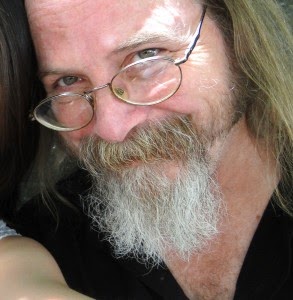A night on muse mountain: Ronen Chamber Ensemble provokes 'The Wolves of Parnassus'
 |
| Michael Schelle howls at the muses in his new Ronen piece. |
While on the mountain, however, the Butler University composer in residence disports himself as he riles the beasts in "The Wolves of Parnassus," the latest of four commissions dating back nearly three decades from the Ronen Chamber Ensemble. Ending its 2014-15 season Tuesday night in Hilbert Circle Theatre's Wood Room, the Ronen premiered the wide-ranging, six-movement piece with exhaustive gusto.
Gradus ad Parnassum, a late Baroque treatise on composition much admired by the Viennese classicists, was mentioned by Schelle in oral program notes before the performance. He was pleased to admit violating as many of its precepts as he could manage.
Schelle's wolves are pack animals and predators upon musical order, particularly in the first and last movements. They are reminders that in addition to being sacred to Apollo, Parnassus also was regarded as having a strong connection to Dionysus, a god after Schelle's own heart.
Written for six musicians — two percussionists (one of whom comes onstage late) and one each playing clarinet, cello, piano, and violin —"The Wolves of Parnassus" begs to be compared with 1986's "Howl!," the jazz-inflected ensemble spin-off of Allen Ginsberg's emblematic poem. That earlier work plunged into the urban maelstrom, but (as I remember it) in a way that seems relatively decorous and goofy at the same time — like a young man's postcard home. The mature Schelle has a a broader view of freedom, and knows even better how to express it.
"The Wolves of Parnassus" howls with conviction from the very start, titled "Vanguard." The movement has the five onstage-throughout players thundering in perpetual motion. Its reflective side soon has an outing, however, as Ronen co-founder/artistic director and cellist Ingrid Fischer-Bellman is featured in a plaintive cantilena honoring her birthplace ("Bucharest").
Specific address to Ronen origins comes a couple of movements later, with (titled in fractured Hebrew) "Ehzehkorh," scored as a duo for Fischer-Bellman and her husband, co-founder/artistic director and clarinetist David Bellman. The movement takes its time setting forth a dialogue in which the writing for each instrument cannily reflects the players' personalities. Listeners who don't know them were free to make their own inferences.
In between is the most Apollonian movement, "Archetype," with Bellman taking up the bass clarinet and notes of added mellowness from Jack Brennan's vibraphone. It forced me to wonder if the music incorporated a slowed-down parody of Debussy's "Doctor Gradus ad Parnassum," at least insofar as it seemed both businesslike and fanciful.
Personal tribute that probed even deeper entered (along with second percussionist Craig Hetrick) in "Claire, 1917," memorializing the composer's mother, who died as he began work on the score. Focused on the year of her birth, near the end of the time when American popular songs were more influenced by operetta than jazz, this movement included wordless singing draped across long-breathed phrases that amounted to a symphony of sighs.
After such an adventure — a sentimental journey juxtaposed with bone-jarring descents and thrilling vistas, the home of the muses presumably remains intact. Schelle implicitly follows the conscientious hiker's standard — take nothing, leave nothing. "The Wolves of Parnassus" is not overwhelmed by its program, in other words. It displayed an unshakable integrity, pushing up against the boundaries of coherence but having calm at its core, like the independent samurai warrior (ronin) punned upon in the finale. The work's other adept performers were pianist Gregory Martin, percussionist Jack Brennan, and violinist Charles Morey.
The program's other work by a living composer was Miho Sasaki's evocative "Reaching," a Midwest premiere memorializing the 2011 Japanese earthquake and tsunami, with Morey, Bellman, and Fischer-Bellman joined by flutist Tamara Thweatt. It was a colorful, yet somber exercise in textures with a slow progression from dark to light, an emanation of the atmosphere that Toru Takemitsu brought to Western-instrument ensembles.
Francis Poulenc's perky, feather-light Trio for Oboe, Bassoon, and Piano opened the concert, played with idiomatic zest by Martin, oboist Jennifer Christen, and bassoonist Oleksiy Zakharov. The three returned after intermission, performing (with the addition of Robert Danforth, horn, and Bellman) Mozart's sublime Quintet in E-flat for Piano and Winds, K. 452.
There was unity in the conception of this piece, particularly in the expressive cresting of phrases, many of them foaming with chromaticism before breaking neatly on the diatonic shore. All five players displayed buoyant, full-bodied tone and were mutually responsive rhythmically.
I would only take exception to Martin's habit of sounding too much like an accompanist in the second movement; in genuine chamber music, particularly that involving piano, passages that look like accompaniment on the page should never recede as much as they did here. Doing so takes away from the ensemble texture; in this case, it was the harmony supporting those overlapping wind-instrument phrases. In mature Mozart, there is always something interesting going on. There's hardly anything that benefits from being thrust into the background.



Comments
Post a Comment